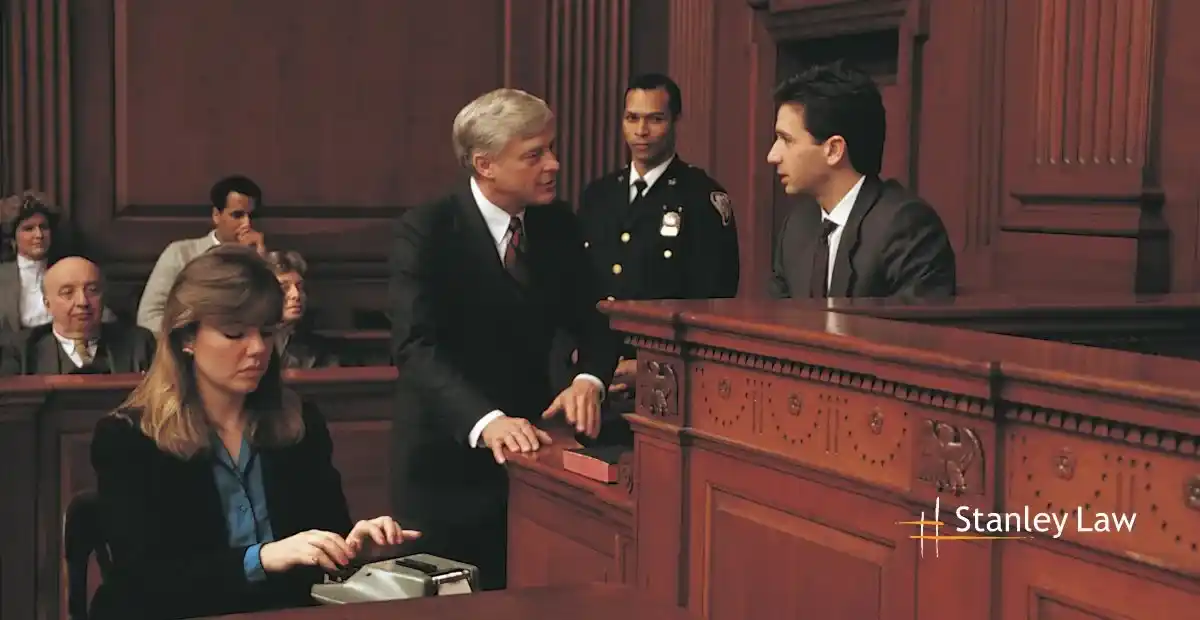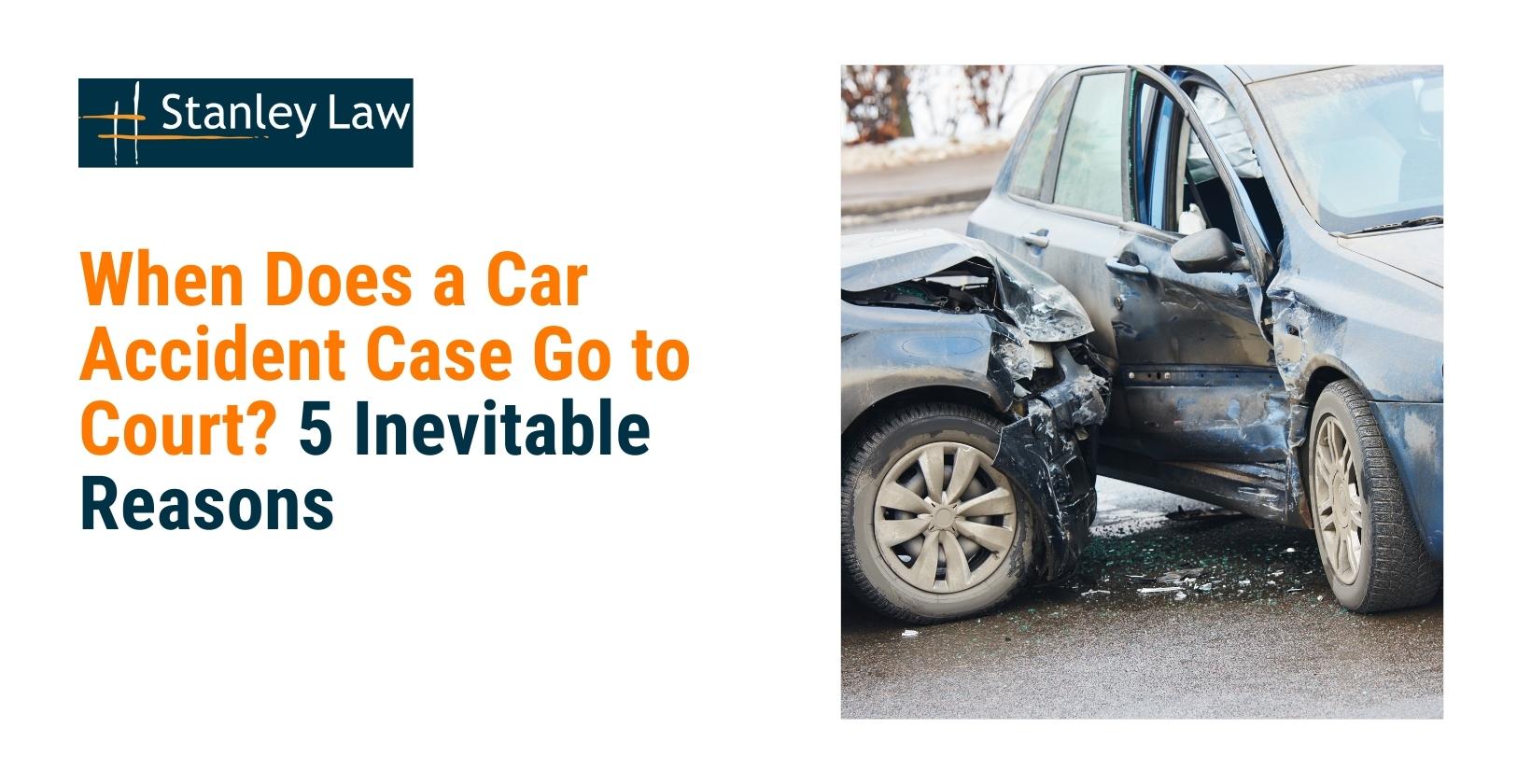If you’ve been involved in a car accident and are facing frustrating settlement negotiations or legal uncertainties, you’re not alone. Many accident victims deal with complex legal processes independently, often unsure when does a car accident case go to court. Knowing when a car accident case might go to trial is essential for protecting your rights and securing fair compensation. Many cases settle out of court, but factors like liability disputes or low settlement offers can lead to a trial. Understanding the court process is key to protecting your rights and securing fair compensation. This guide outlines five reasons your case might go to court, explains the legal process, and provides tips for preparation with a car accident attorney.
Key Reasons Why Car Accident Cases Go to Court
Not all car accident claims result in settlements. Sometimes, court intervention is necessary when the involved parties can’t agree. Here are the five most common reasons why a car accident case might go to court:
1. Complex Legal Issues
Disputes over liability and unclear laws can necessitate a court decision. Here’s why this might push your case to court:
- Disagreements Over Fault: Court proceedings may be needed to determine responsibility when both parties dispute fault.
- Unclear Legal Standards: Variations in state laws or ambiguous regulations can necessitate a court decision for clarity.
2. Insufficient Settlement Offers
Another common reason car accident cases go to court is that insurance companies make offers that do not cover the victim’s damages.
- Underestimated Claims: Insurers may minimize the extent of your injuries or property damage.
- Rejected Settlements: If a settlement offer is too low, going to court may be the best way to secure fair compensation.
3. Serious Injuries and High Damages
In cases of more significant damage or severe injuries, the stakes are higher, and victims often feel that the offered compensation isn’t sufficient.
- High Medical Expenses: Serious injuries may result in high medical bills exceeding initial offers, prompting victims to sue for full compensation if long-term treatment is needed.
- Extensive Property Damage: Major property or vehicle damage can lead to disputes if repair costs exceed the insurer’s insufficient offer.

4. Disputes with Insurance Companies
Sometimes, the issue is more than the settlement offer; it is about the insurance company acting in bad faith.
- Claim Denials: Insurance companies may deny claims, forcing victims to take legal action for rightful compensation.
- Bad Faith Practices: Unfair treatment by insurers may require court resolution.
5. Plaintiff’s Choice for Full Justice
Finally, some plaintiffs take their case to court even when a settlement is possible.
- Seeking Full Compensation: Court may be necessary if a settlement won’t cover your damages.
- Public Accountability: For some, a court trial ensures the responsible party is held publicly accountable.
Settlement vs. Court: What’s the Difference?
Choosing between settling a car accident case out of court and going to trial depends on your circumstances. Here’s what to expect from both options:
Pros and Cons of Settling Out of Court
Pros:
- Faster Resolution: Settling out of court usually leads to a quicker resolution than a trial.
- Lower Costs: Avoiding a trial means saving on court fees and extended attorney costs.
- Less Emotional Strain: Settling helps avoid a trial’s uncertainty and emotional stress.
- Control Over the Outcome: Settlement lets both parties negotiate terms for a more predictable result.
Cons:
- Lower Compensation: Settlements may only cover part of your damages if the initial offer is too low.
- No Public Accountability: Private settlements mean the other party does not publicly admit fault.
- Pressure to Settle: Insurance companies may pressure you to settle for less than you deserve, especially early on.
Pros and Cons of Going to Court
Pros:
- Potential for Higher Compensation: Trials can lead to larger awards, especially with significant damages or strong evidence.
- Public Accountability: A trial holds the responsible party publicly accountable for their actions.
- Legal Precedent: A trial outcome can set a precedent that helps similar cases later.
Cons:
- Higher Costs: Trials involve more legal fees, expert witness costs, and court fees.
- Longer Duration: The trial process can be lengthy, delaying the resolution of your case.
- Emotional Stress: Going to court can be emotionally exhausting, especially if the outcome is uncertain.

Car Accident Court Process
If your car accident case goes to court, understanding the steps involved can help you feel more prepared and less shattered. Here’s what you can expect from start to finish:
Filing the Lawsuit
The first step is filing the lawsuit and officially starting the legal process.
- Preparing the Complaint: Your attorney will help you draft a complaint detailing your case and the damages sought.
- Filing the Complaint: Once it is ready, it will be submitted to the court, officially opening the case.
- Serving the Defendant: After filing the complaint, the defendant must be served with a copy, notifying them of the lawsuit.
Discovery and Evidence Collection
In the next phase, you’ll gather and exchange information with the other party to build your case. This phase is known as discovery.
- Depositions and Documents: Both sides will request documents, take depositions, and exchange any relevant information, including medical records, accident reports, and witness statements.
- Gathering Evidence: Your attorney will help you collect all the necessary evidence, such as photos, videos, and expert evaluations, to support your claim.
Pre-trial Motions and Hearings
Before the trial, pre-trial motions and hearings address legal issues:
- Pre-Trial Motions: Your lawyer may file motions to exclude certain evidence.
- Attending Pre-Trial Hearings: These hearings allow both parties to argue motions and for the judge to make rulings.
The Trial Process
You’ll go through several key stages if your case proceeds to trial. Here’s how the trial will unfold:
- Jury Selection: A jury is selected to hear the case and make a decision.
- Opening Statements: Both attorneys will present their initial arguments, explaining what they intend to prove during the trial.
- Witness Testimony: Witnesses and expert witnesses provide evidence to support each side’s arguments.
- Closing Arguments: Both sides summarize key points and make final arguments to the jury.
Post-trial Considerations
Even after a verdict, there may be further steps to take:
- Appeals: Either party can file an appeal if they disagree with the verdict.
- Judgment Enforcement: Ensure compliance with the court’s decision and collect awarded damages.
- Post-trial settlements: Negotiate a post-trial settlement to resolve any remaining disputes.
Preparing for a Court Case
Proper preparation is key to a successful car accident lawsuit. Taking the right steps can strengthen your case and improve your chances of a favorable outcome. Here’s how to prepare:
Gathering Crucial Evidence
Collecting and organizing evidence is one of the most important aspects of preparing for court. This evidence will help support your claims and demonstrate the full extent of your damages:
- Medical Records: Gather all medical records of your injuries, including diagnoses and treatment plans, to prove their severity.
- Witness Statements: Get witness statements; their accounts can support your version of events.
- Accident Reports: Request the police report from the accident, as it provides an objective account and helps determine fault.
- Photographs and Videos: Collect visual evidence, like photos of the accident scene, vehicle damage, and injuries, to support your claim for damages.
Working with Your Lawyer
Effective collaboration with your lawyer strengthens your case. Here are some specific ways to work closely with your legal team:
- Schedule Regular Check-ins: Regular meetings with your lawyer to stay updated on your case.
- Organize Your Documents: Organize all relevant documents by categories, such as medical records, damage estimates, and witness statements, for easy review by your lawyer.
- Provide Full Disclosure: Be honest with your lawyer about all case details, as even small points can matter.
- Prepare for Meetings: Bring new documents, ask questions, and take notes during meetings with your lawyer.
- Follow Legal Advice: Trust your lawyer’s expertise and follow their recommendations closely.
Understanding Court Etiquette and Proceedings
Knowing what to expect and how to behave in court can help you feel more confident and make a good impression:
- Courtroom Behavior: Dress professionally and respect the judge and court staff; your demeanor matters.
- Stay Calm During Testimony: If testifying, listen carefully, answer truthfully, and stay composed.
- Familiarize Yourself with the Court Process: Ask your lawyer to explain the trial day’s schedule to reduce anxiety and ensure you’re prepared.
Importance of Professional Legal Guidance
A car accident lawsuit can be challenging due to insurance issues, legal procedures, and emotional stress. An experienced Syracuse car accident lawyer can negotiate with insurance companies, handle legal issues, and build a strong case to maximize compensation.
At Stanley Law Office, we offer personalized legal strategies to increase your chances of a favorable outcome. With extensive experience in car accident cases, we’re dedicated to fighting for your rights.
Why choose Stanley Law Office
Stanley Law Office is a trusted partner for car accident victims, offering:
- Tailored Legal Strategies: We customize our approach by analyzing your case to create a strategy that matches your goals, whether settling or going to court.
- Proven Track Record: Our firm has secured millions for car accident victims, aiding their recovery from minor to catastrophic injuries.
- Client-centered Approach: We believe in clear communication. You’ll always know your case status, and we’ll guide you through the legal process.
At Stanley Law Office, you’re more than just a case number. You’ll receive personalized attention and expert representation for a successful resolution. Let us handle the legal complexities—contact us today!
Conclusion
A car accident case may end up in court for various reasons, such as complex legal issues, low settlement offers, severe injuries, or disputes with insurance companies. Knowing when a case may go to trial and preparing for it is crucial for a favorable outcome. Whether handling liability issues or seeking fair compensation, having the right information and legal help can make all the difference. Professional legal guidance is essential for overcoming challenges and increasing your chances of success.
If you’re uncertain after a car accident, don’t handle the legal process alone. Contact Stanley Law Office today for expert guidance and peace of mind. Our experienced team is here to fight for your rights and help you get the compensation you deserve.
When Does a Car Accident Case Go to Court? : FAQs
How Long Will My Car Accident Lawsuit Take?
Car accident lawsuits typically take a few months to a few years, depending on the case’s complexity and court schedules.
What Should I Do If I Receive a Low Settlement Offer From My Insurance Company?
Consult a lawyer to help negotiate a better settlement or prepare for litigation. They can advocate for fair compensation on your behalf.
Can a Car Accident Case Be Resolved in Court Without Going to Trial?
Yes! Many cases are resolved through mediation or arbitration before they reach trial, allowing both parties to avoid the courtroom.
What are the Financial Implications of Taking a Car Accident Case to Court Versus Settling?
Going to court generally involves higher legal costs and fees. Settlement can be quicker and less expensive but may result in lower compensation.
How Does the Presence of Multiple Parties Affect a Car Accident Lawsuit?
Involving multiple parties can make the case more complex and lengthen the process, as each party may have different levels of liability.
What Role Do Expert Witnesses Play in a Car Accident Court Case?
Expert witnesses provide specialized knowledge, such as accident reconstruction or medical evaluations, which can help clarify complex issues and strengthen your case in court

